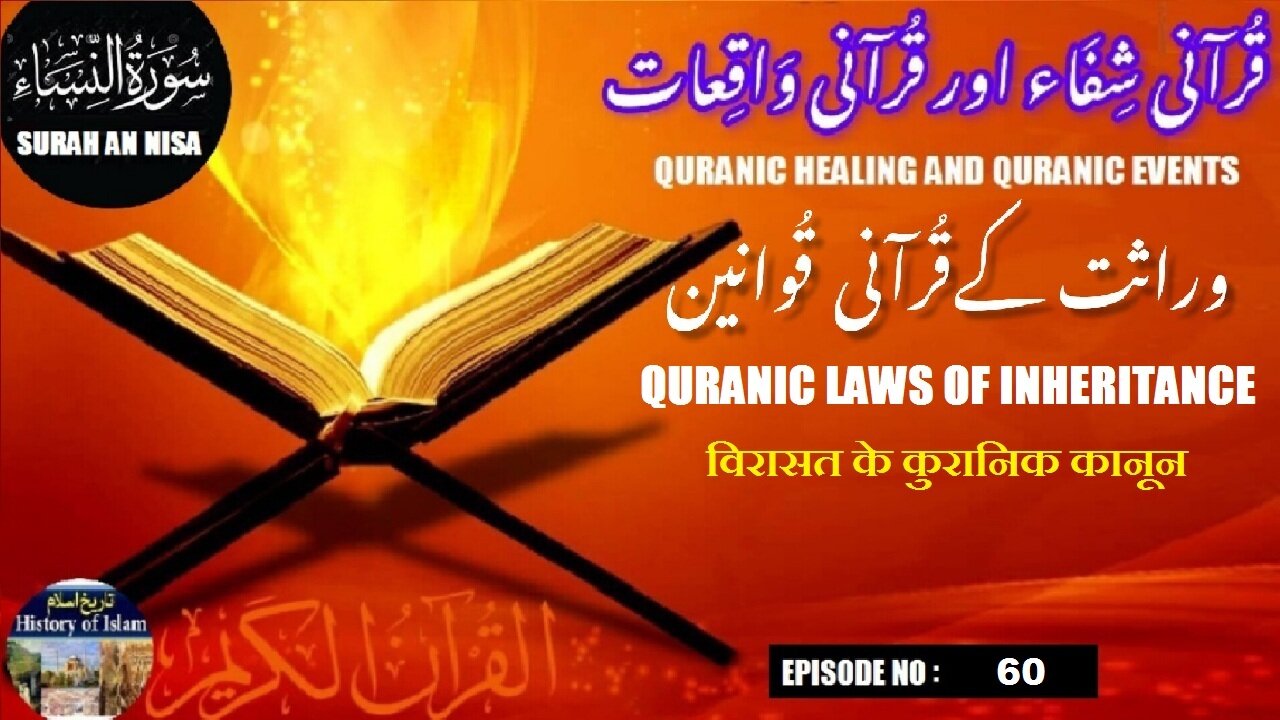Premium Only Content

Quranic laws of inheritance विरासत के कुरानिक कानून وراثت کے قرآنی قوانین
@islamichistory813 #quranic #inheritance #laws #fair #distribution #decreed #by #allah #healing #and #events #from #the #quran #historical #stories #and #events #quranicstories #selfhealing #success #stories #striking #events #in #history #quranstories, #storiesfromthequran #religious #creation #stories #trending #quran #short #historical #loves #historical #heroes #what #is #true #strength #calm #quran #recitation #for #babies #islamic #healing
Islamic Inheritance Law: Who Gets What According to the Qur’an?
Assalamu Alaikum, wa Rahmatullahi wa Barakatuhu.
Brothers, sisters, friends and elders, we are presenting the 60th episode of the Islamic informative video based on healing and events from the Holy Quran, and in this episode we will describe,Islamic Inheritance Law: Who Gets What According to the Qur’an?
Qur’anic Inheritance Laws: Fair Distribution as Decreed by Allah (Surah 4:7, 4:11–12, 4:176)
The Qur’anic inheritance laws, detailed primarily in Surah An-Nisa (4:7, 4:11–12, and 4:176), represent a revolutionary legal framework in human history. These laws are designed to ensure the fair and just distribution of a deceased person’s wealth among surviving relatives, based not on personal whims or cultural traditions, but on divine decree. Inheritance in Islam is not merely a matter of financial settlement—it is a matter of justice, equity, and obedience to Allah. The Qur’an’s detailed inheritance guidelines seek to prevent disputes, eliminate favoritism, and uphold the rights of every eligible family member, especially those historically marginalized, such as women and children.
Surah An-Nisa 4:7 lays the foundational principle: “For men is a share of what the parents and close relatives leave, and for women is a share of what the parents and close relatives leave, be it little or much—an obligatory share.” This verse is remarkable in its time and context, as it established the right of women to inherit—something widely denied in pre-Islamic Arabia and many other ancient societies. The Qur’an unequivocally grants women an equal status in the right to inherit, though not always in equal proportion, reflecting the broader financial responsibilities assigned to men in Islamic law, such as providing for their families.
Surah An-Nisa 4:11–12 then details specific inheritance shares for different relatives. For instance, a son receives a share equal to that of two daughters, a principle based on the Islamic legal structure in which men have greater financial obligations, such as providing for their wives, children, and extended family. If the deceased leaves only daughters, two or more daughters share two-thirds of the estate, while a single daughter receives half. Parents also receive fixed shares: each parent gets one-sixth if the deceased has children, while the mother may receive one-third if there are no children and no multiple heirs. A spouse's share also varies: the wife receives one-eighth of the estate if there are children and one-fourth if there are none. Similarly, a husband receives one-half if there are no children and one-fourth if children exist.
The Qur’an emphasizes that these shares are not optional suggestions but obligatory commands from Allah. Surah 4:11 concludes with the words: “These are limits set by Allah. And whoever obeys Allah and His Messenger will be admitted to gardens beneath which rivers flow... But whoever disobeys Allah and His Messenger and transgresses His limits—He will put him into the Fire...” The gravity of these words shows that inheritance is not a matter for human negotiation or favoritism. Altering or violating these proportions is seen as defying Allah’s law and is treated with utmost seriousness.
Surah An-Nisa 4:12 continues by elaborating on the inheritance rights of spouses and siblings. If a man or woman dies without children or parents, siblings become eligible to inherit. For instance, if the deceased has a brother or sister from the same mother, they each receive one-sixth if there are two or more, or the full one-third if there is only one. These laws ensure that wealth remains within the extended family, but is distributed equitably and without bias.
Later, Surah An-Nisa 4:176 addresses a specific inheritance scenario that had puzzled the early Muslims: the inheritance rights of a half-sibling from the same mother or father when the deceased has neither parents nor children. The verse clarifies that if a man dies without children or parents but leaves a sister, she receives half his estate. If he has two sisters, they get two-thirds. If he has brothers and sisters, the male’s share is equal to that of two females, following the same rationale used in other parts of inheritance law. This ruling resolved confusion among early Muslims and confirmed the completeness and precision of the Qur’anic inheritance system.
What makes the Qur’anic inheritance laws unique is their divine source, detailed specificity, and moral vision. Unlike many other legal systems where inheritance was often dictated by custom or the will of the patriarch, Islam ensures that every eligible heir receives their due share without being disinherited or marginalized. The distribution is not left to the personal discretion of the dying individual or the surviving relatives. Instead, it reflects Allah’s wisdom, balancing familial responsibilities, economic needs, and social justice.
In conclusion, the Qur’anic inheritance laws outlined in Surah An-Nisa (4:7, 4:11–12, 4:176) provide a just, organized, and divinely guided framework for wealth distribution after death. These laws uplift the rights of women, protect the weak, and prevent familial disputes. By mandating obedience to these laws, the Qur’an underscores that true justice comes not from cultural traditions or personal preferences, but from adherence to Allah’s commands. Inheritance, in Islam, is not only a legal matter—it is a sacred trust.
With this, we ask for your permission until tomorrow and pray to Allah Almighty to grant us the ability to act on the Quran and Hadith, Amen
MAllah Hafiz
============================
-
 7:30
7:30
ISLAMIC HISTORY
1 day agoWho are the true believers according to the Quran قرآن کے مطابق سچے مومن کون ہیں؟
1 -
 3:11:00
3:11:00
TimcastIRL
3 hours agoTrump Kills 11 Narco Terrorists, Democrats Warn War With Venezuela Coming | Timcast IRL
111K99 -
 13:07
13:07
Robbi On The Record
3 days ago $4.35 earnedSweet Poison: The Big Fat Lie That’s Killing America
31.6K19 -
 LIVE
LIVE
Drew Hernandez
8 hours agoEPSTEIN VICTIMS SPEAK OUT & TRUMP DOUBLES DOWN
892 watching -
 1:36:41
1:36:41
FreshandFit
3 hours agoWe Are QUITTING YouTube...
23.1K27 -
 2:34:22
2:34:22
TheSaltyCracker
3 hours agoDrug Smugglers Blown Up 9-03-25
56.3K129 -
 LIVE
LIVE
VapinGamers
2 hours ago $0.49 earnedGrim Trials - Game Review/Playthru - Rougelight Dungeon Crawler - !rumbot !music
74 watching -
 2:47:55
2:47:55
Mally_Mouse
10 hours ago🎮 Let's Play!! -- Jak 2 pt. 16
20.4K1 -
 52:23
52:23
MattMorseTV
4 hours ago $14.44 earned🔴The Cartels are SCREWED.🔴
89.6K112 -
 1:32:46
1:32:46
Badlands Media
18 hours agoAltered State S3 Ep. 44
29.6K